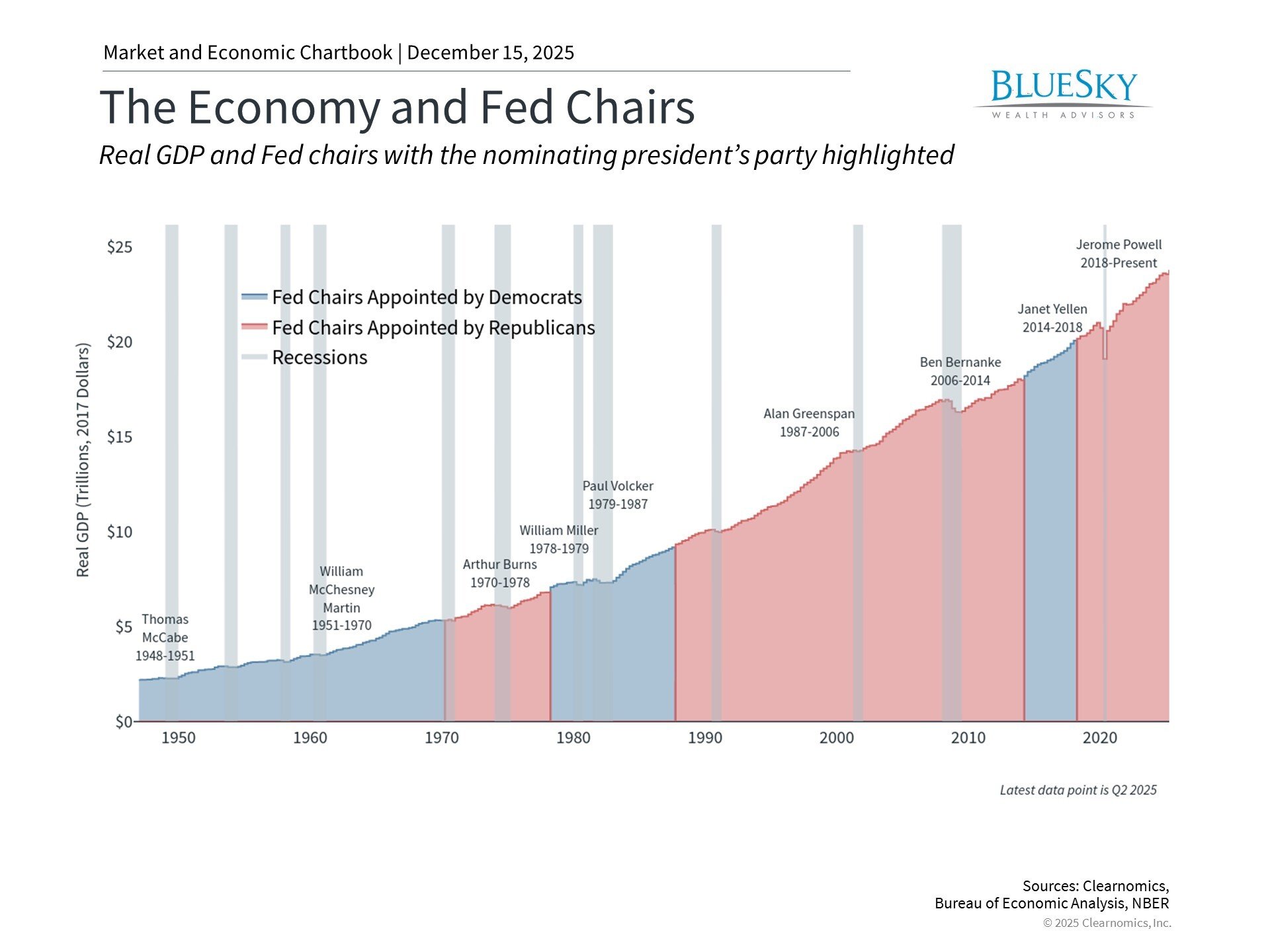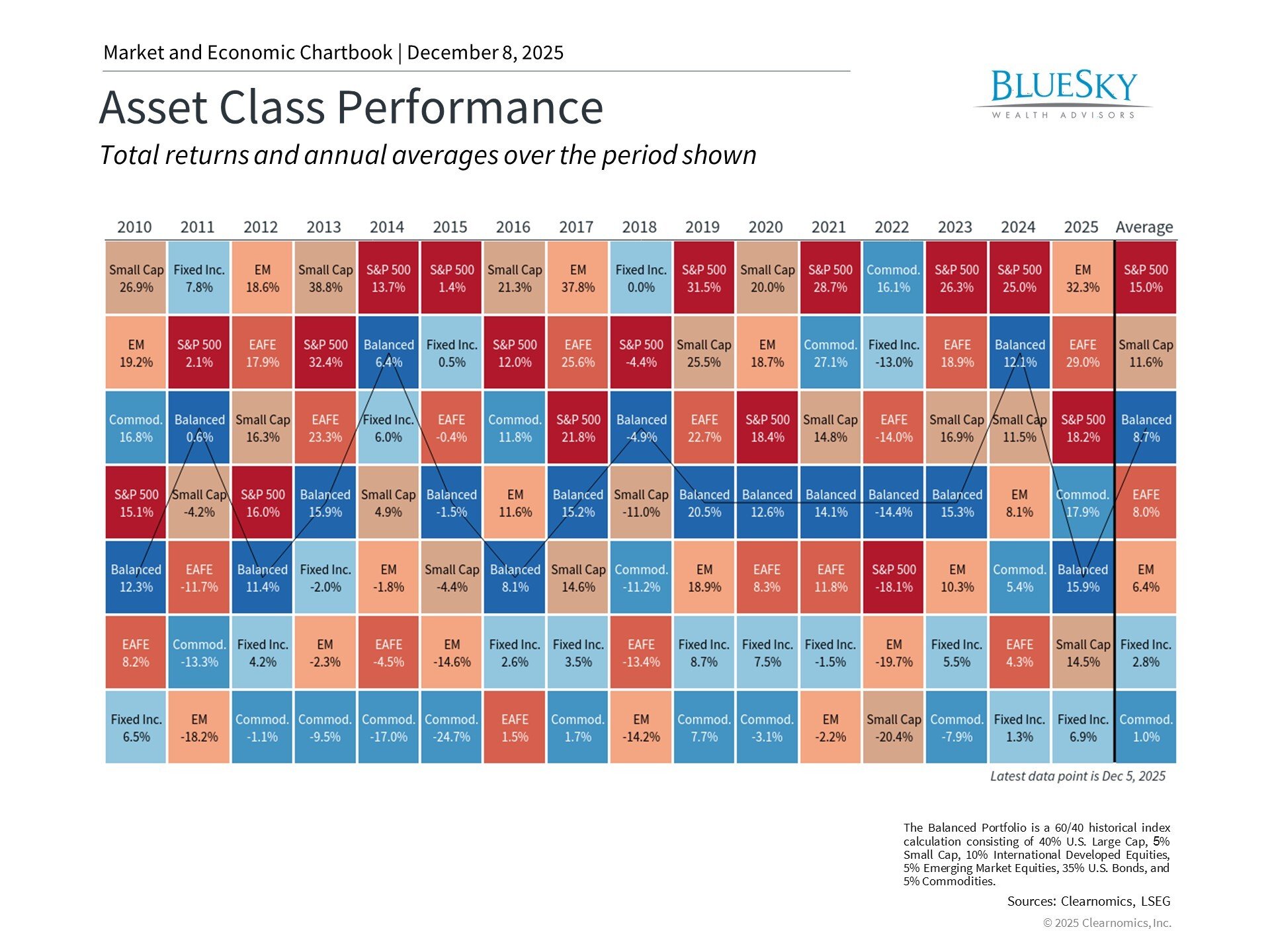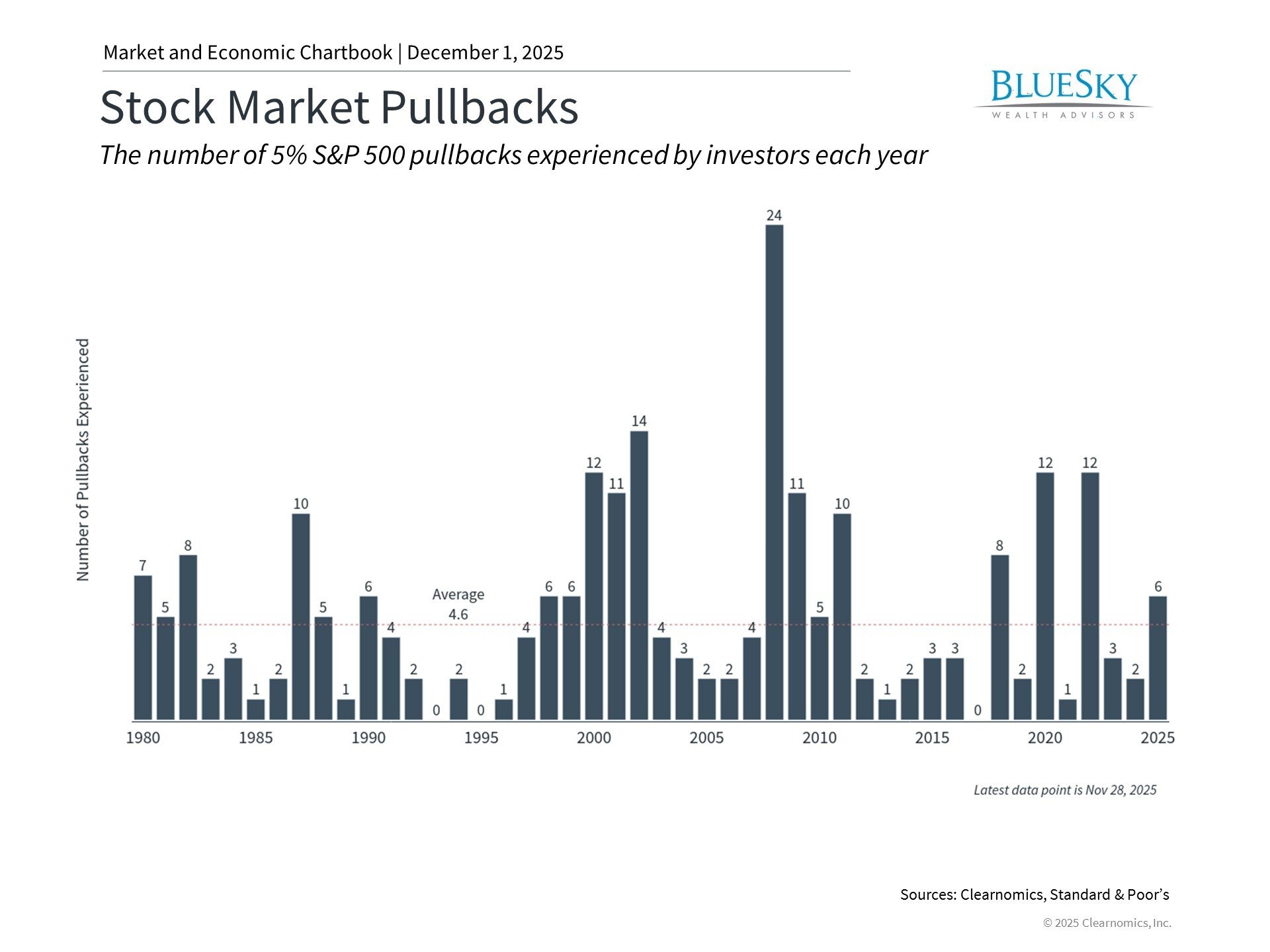
BLUESKY LIVE Q&A RECAP: ADDRESSING YOUR QUESTIONS AND CONCERNS
BLUESKY LIVE Q&A RECAP: ADDRESSING YOUR QUESTIONS AND CONCERNS

In BlueSky’s Special LIVE Webinar on Friday, March 27th, David Blain, CFA dug deep to answer the questions and concerns of our clients facing the current market. Check out a recap of a few questions below.
How does your [David Blain] experience investing help us during this time?
David Blain: Well, I started investing actually when I was a cadet at West Point. Well, I started investing as a kid, but I started investing in stocks seriously when I was a cadet at West Point way back in 1987. And for those of you that are a student in market history, you’ll know that 1987 there was a massive crash where the Dow lost over 23% in one day. And that was my first year really investing in stocks. Of course, we went through that. There was the recession of the early ’90s, late ’80s early ’90s, various panics along the way. Wars, famine, Zika virus, Ebola, different other pandemics around the world. Well, maybe not pandemics, but healthcare challenges.
We also had the tech bubble of 2000, 2001, and of course, the great recession of ’08 and ’09. And each one of these declines is a little bit different. It’s triggered a little bit differently, but the same patterns emerge. And I don’t think we’ve quite hit a bottom, there’s still probably some panic left in people, some panic selling. We saw a couple of good days early in the week, which is very typical to see some sort of rebound as people with money and cash start to take advantage of these low prices. But I think you’ll probably still see some selling in the weeks ahead as additional information comes out. There may be a global recession, maybe not, a recession is actually defined as two quarters in a row of negative GDP growth. We’re certainly going to have one quarter, I would imagine, of negative GDP growth. Most economists are predicting somewhere between a -15 and -20 decline in economic activity.
People ask me about my experience, well when I started, I started investing in individual stocks. And for those of you that have been with Blue Sky for many, many years, you’ll know that when the company first started, we did, we used individual stocks and bonds in our portfolios. And what’s happened over the years is the markets have changed, we have a lot more hedge funds, we have program trading, we have algorithmic trading and we have the flow of information is sort of ubiquitous. And the risk reward of holding individual stocks is just not worth it anymore. Yes, there are still some people out there picking individual stocks, but for 99.8% of the population, there’s no reason to hold an individual stock. This is a good chance to get rid of them.
Can you speak to how global investments may or will be impacted by the COVID-19 buyers, as the pandemic spreads to countries not prepared to handle the outbreak?
DB: Sure. I mean, at some point… And, this is not the first pandemic that’s ever happened in the world. There have been other pandemics. There have been a lot of worse pandemics in individual countries. And so, what will happen is, as more people become immune, the rate of infection will slow down. Not everyone that gets it is getting sick and dying.
The biggest concern, and the reason we’re slowing everything down is, to make sure that the healthcare systems do not get overwhelmed. But the reality is every pandemic will reach a point where the transmission rate eventually falls below, what we call the R subzero number. And, it’s through a combination of vaccinations, what we call herd immunity is, people become immune at some point. But it is going to have an economic toll, but we cannot keep the world shut down forever for this.
And so, countries will have to adapt. They’ll have to bring a manufacturing back online, there’ll have to still be food being produced and things like that. I don’t know when this will happen. I don’t subscribe to the disaster scenarios that people have. Is it serious? Sure, it’s absolutely serious. I also grew up at a time when nuclear annihilation of the entire planet was a couple of button pushes away, between the Soviet Union and the United States.
I also like to say, there are a couple of companies, Mercedes-Benz was around in Nazi Germany before World War II. There were a lot of Japanese companies that were around before World War II and these companies survived and are in existence today. And so, the notion that this will wipe out the entire global commerce and economic system, I just don’t ascribe to that theory.
Frankly if that happens, the stuff that we’re talking about now in your portfolio and things like that aren’t going to matter anyway. Is it a possibility? Sure, it’s a very remote possibility. The most likely scenario is that countries and companies are going to adapt to a new reality, as they generally do, to whatever solution this virus may bring.
Should we be concerned the recent market highs will be like the Nikkei in 1989? That is, never to see again with at least a 30-year timeframe.
DB: Sure. While there are some concerns with that, the economy of Japan and the United States are at very different places in their growth. It is possible.
I mean, I actually was more concerned about that in previous times and it is a possibility but it’s not going to happen overnight. And once again, as long as the entire global system does not collapse, our portfolios will adapt to that. Just like emerging markets are, we’re now emerging markets, 30 years to speak of. Today it’s about 11% to 12% of the world’s stock markets.
And so, the world changes, the U.S. was an emerging economy at once. At its peak it was probably 80% of the world’s market capitalization, today it’s down to 55%. And so, as time goes by it will continue more than likely to shrink.
For those of you that are quarantined at home or stay at home, there’s a great book that I encourage you to get. It’s called Fewer, Richer, Greener. It’s by Laurence Siegel, who is the head of the CFA Research Institute. And, he paints a very optimistic picture of the future, despite the pandemic.
I think it’s important to not focus on what’s happening the next month or two months but where the world is headed. And, the reality is the world, as a whole, is much better off than it’s ever been. And, the trajectory is continuing to go in that direction. When you look at the gains being made in all sorts of different areas, health care being one of them—I mean, the speed at which vaccines and drugs are being developed for this virus is just astonishing. And, the sequencing of the DNA of this virus was accomplished faster than any other virus in human history. And, those type of advances are going to continue. And, I still believe that a lot of those are going to be led from the U.S. I don’t see a Japanese style economy taking place but I acknowledge that there is a remote possibility of that happening.
Do you think current stimulus packages are sufficient to stabilize market? Or, should we anticipate more needs to be done? How big do you think these stimulus packages will be in total?
DB: That’s a great question. It’s a total function of how long the stay at home, sort of lockdown, self-quarantine orders stay in place. If it continues to go on for months and months, they’re going to have to do more. If we see some restrictions lifted in the relatively short term, what I mean by that, a couple of weeks, 30 days, you could see the need for stimulus being reduced.
I mean, the one that they just announced right now does have dollar limits on it. I think the things that they’re doing are addressing people on unemployment, of course, and businesses encouraging they stay open. But, it’s simply a function of how long businesses have to be shut down, number one.
And number two, how confident the public is, once things are open again. The government could say, “Hey, go out to eat again.” But, if people don’t want to do that or are still nervous, they’re not going to do that. I don’t really have an answer to that question. My sense is that before it’s done, there’ll be more stimulus than is on the table now and it will probably be needed.
What are your views on the energy sector given the Saudi/Russia fight on market share? Indications are the fight “will go on for years”.
DB: Yeah. I think the oil… It’s interesting if you rewind the clock, several years ago we were talking about the demise of oil and running out of oil. And then of course, peak oil, peak oil demand and now we’re awash in oil. The producers are certainly getting hurt. All in all, almost everything is made from petroleum products. And I’m not just talking about gasoline. Plastics. You’d be surprised at all the different products that are made from petroleum, in the end the lower oil prices are actually a boom for the economy. They’re generally thought of as a stimulant to economic growth is lower oil prices. In their particular case, I think the Saudis or the Russians, one of them is going to cave because they’re dependent on the price. The price of oil that Saudi Arabia can withstand is probably a lot lower than Russia. Low oil prices for Russia is going to really collapse their economy a lot faster than Saudi Arabia and I do think it’s going to go on for a long time. It’s certainly hurting our shale producers. But once again, if you look at the cost of extracting oil in America, it has come down significantly over the last decade and technological innovation will continue to improve or reduce the cost to extract it from the ground. I do see some relief to that, but all in all, lower oil prices are good for the economy.
Are there any investments outside of the fixed income equities sector that are worth exploring such as real estate?
DB: Sure. REITs are great. They do have a fairly high correlation, meaning they track the stock market somewhat, although we’ve seen some disconnect in this crisis. They also are impacted by interest rates, but over time, as opposed to the stock market, real estate is based on the net income of the properties that they have. It is affected by the overall economy in the public markets, but it does have a different risk reward profile than the stock market itself. I’m particularly akin to commercial real estate as opposed to individual rental properties and people that own it now and their one tenant loses their job and can’t make the mortgage payment. That’s way too big of a risk. Owning individual residential rentals, the rate of return versus risk is not there, similar to individual stocks.
I prefer to use commercial real estate, number one where you have multiple tenants, you can have multiple locations. They’re not immune to economic downturns by any extent, and it’s going to be the same. You’re going to have property owners that can’t make their mortgage payments and you’re going to have to be forced to sell.
So far in all the real estate markets that I’m involved in, all the buildings and properties, certainly the residential are still doing pretty well, haven’t had any problems there. The office, retail, haven’t really had many problems yet. Maybe a couple of phone calls here and there about tenants asking what flexibility we have. But certainly, there’s been no wide scale disruption yet to the real estate market. I think the paycheck guarantee loans are going to help. If you haven’t read the bill, I went through it quickly, but some of the small business loans, if you take out a loan under this relief package and you use that money to pay your employees, payroll, rent, utilities, mortgage, those types of things, that will be forgiven.
Now, I’m not sure that will be forgiven, but that’s part of the stimulus – if you borrow money from the government at 4% interest, which is what the bill, I think… Under 4% interest, and you use that money to pay your rent, the principal’s forgiven, and you have 10 years to pay it back, yeah, it’s going to impact real estate. Once again, if you have a diversified real estate portfolio, you’re smart about the properties you buy, you’ll be fine. The REITs in our BlueSky portfolios have certainly declined from where they were a couple of weeks ago, but the dividend payouts are way up, which is one of the big reasons that you buy the REITs, is they have large cash payments based on the dividends.
How does the crash of 2008 compare to the crash in 1929? Does your model include the low stock price gains throughout the 1960s and 1970s?
DB: It does not incorporate the crash of 1929. The reason it doesn’t, the controls on the stock market were nowhere near what they are today. In fact, you have the investment advisors act of 1940, which is what we’re governed under as well as the securities act of 1933 which brokers are governed under. Those were enacted after the Great Depression, and to some extent we don’t think that the market including that is helpful, we don’t include the Great Depression modeling. Our new gold standard is 2007 and 8, which is about a 55% or so decline in the market value of equities. It does incorporate the low returns of the 60s and 70s, and you see this. Last decade was actually the first decade in the history of the US market that there wasn’t a recession, our modeling does include the pricing of the 60s and 70s. You basically had some really awful return periods. It also incorporates interest rates which have been this low before. World War II, directly after World War II interest rates were extremely low and in fact that was the bond bull market from the 40s, all the way up to 1980, interest rates went from in the 1% range, 1, 2% range all the way up to 14%. it does incorporate those periods. Our financial planning software modeling does not go back to 1929 though.
It’s hard to understand how you can predict the economic recovery when the pandemic is unprecedented medically. It may not be like the previous downturns. What is our plan if pandemic virus would mutate and return in waves?
DB: That’s a good question. First of all, to be clear, I’m not predicting anything. I have a good feel of what’s happening. I understand the way that financial markets work. I think I mentioned I’m on the board of a major health system and I have to be very involved with what’s going on with the pandemic itself, as we have 27 locations spread across North Carolina including everything from a hospital as well as everything from heart surgeons to regular physicians and everything in between. Anyway, I do know what’s going on. What I do know is that nobody can predict it. How do you plan in the face of uncertainty? And that’s what we do as planners. It’s what I had to do when I was in the military, fighting in combat, is you don’t know what’s going to happen.
You have somewhat of a plan. You have some historical precedent, you have safeguards, you have backup plans, you have secondary plans. But what you don’t want to do is bet everything on predicting what is going to happen exactly. At this point, to change the portfolio around based on that probability that this the next black plague, I think, would not be a wise decision. If it comes to that we’ll certainly let people know and adjust along the way. But remember we’re trying to plan in the face of uncertainty and right now there’s no reason to believe that this is going to wipe out the majority of people. The biggest crisis we have right now is the temporary overcrowding of our hospital facilities and not enough key pieces of equipment like respirators and things like that. There are vast swaths of the country, and I can tell you my own health system, we have a 350, 400 bed hospital. We have no patients. We have no coronavirus patients at all in our entire health system, and we’re over a billion-dollar health system. It’s not everywhere. Yes, it’s spreading, and it could continue to spread and next week we could have our ICU overflowing. The physical distancing that’s taking place, keeping away from people, some basic things are definitely helping stem this pandemic, but we are in fact planning in the face of uncertainty and when we do that, history has proven to take things as they are and not make wild predictions based on uncertain information that you then later have to undo. I hope that answers your question.





